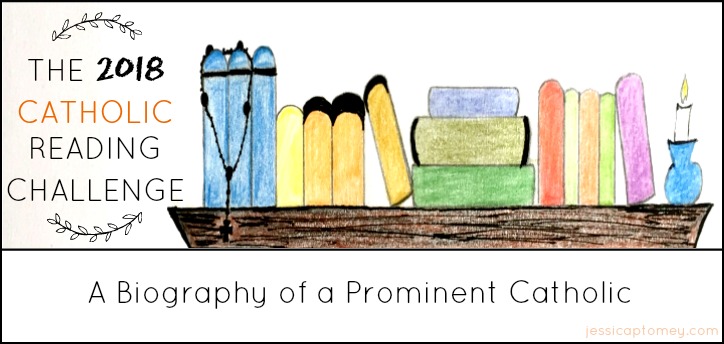The 2018 Catholic Reading Challenge is underway, and I will be sharing my picks for each category about once a month. It’s time for my first pick…

Category: “A Biography of a Prominent Catholic”
My Pick: Love is the Measure: A Biography of Dorothy Day by Jim Forest (love the cover art on this hardcover edition)
I must admit that I knew very little about Dorothy Day’s life and work before reading this captivating biography. Jim Forest, who knew and worked with her the last couple of decades of her life, does a masterful job of introducing you to a tangible person who cannot be boxed into a tidy category or stereotype. This book, especially the first half describing her early life and conversion, was a real page-turner for me. The chapters are not very long, and one propels you into the next.
Aspects of Dorothy’s life that stood out to me:
- Prayer was her fuel.
- She grasped the meaning and need for penance.
- She loved the Church and Her dogma, even though she called attention to flaws in faith practice.
- She understood and embodied detachment to earthly possessions.
- She was an avid reader, and she particularly loved and repeatedly read the great Russian authors (Dostoyevsky, Tolstoy and Chekhov).
- She attended daily Mass early each morning.
- She was — and perhaps this was particularly convicting for me personally — most comfortable when she was around the poor and imprisoned.
- She saw the work of justice as a work of mercy.
- Though she was someone who had experienced a great deal of hardship and sorrow in life, she actually was moved toward God out of thankfulness for the beauty and joy she saw in life. She wasn’t drawn to prayer or belief in a Creator because she wanted something from Him; she recognized that life’s beauty could not possibly exist without Him, and for that she must give thanks.
In addition to learning a detailed account of Dorothy’s life, work, and faith journey, I was educated on various aspects of the American political, social, and religious climate of the last century. My eyes were opened to a great deal of injustice that occurred in the name of “God” and “country,” because I was reading the account of someone who was interacting with it on a visceral, human level — not an ideological one. When you are in a cell next to an inmate or sleeping in a cot next to the homeless, you make those people real for others too.
While reading about Dorothy’s life, I told my husband that in some ways “I don’t feel like a real Christian.” That is not because I agree completely with all of her convictions and actions, but because I think my life is shamefully lacking in communion with the poor. Regardless of whether I would agree with Dorothy’s stance on all social issues matters much less than how her witness of authentic faith could improve my own. I think that is what you interact with when you encounter a well-told narrative of a life well-lived — you hope that person’s story makes an imprint on your own.
I will leave you with the quote that inspired the book’s title, one Dorothy took from St. John of the Cross and repeated often:
“Love is the measure by which we will be judged.”
What did you read for “a biography of a prominent Catholic”?

Copyright 2018 Jessica Ptomey

I just read my first book by Dorothy Day last month for book club — On Pilgrimage, which I understand not to be super representative of most of her work. But parts were so fascinating that now I want to know more about her!
Oh, interesting. She had a column that ran periodically in The Catholic Work paper under the same name…was the work that you read a compilation of those columns perhaps? Or maybe the same title was just used.
I read and enjoyed “The Life You Save” in which the author Paul Elie interwove a biography of Day with one of Flannery O’Connor, Thomas Merton and Walker Percy last year. Might be interesting to read one dedicated just to her.
Good to know, Joy. I have that one sitting on my bookshelf waiting to be read.